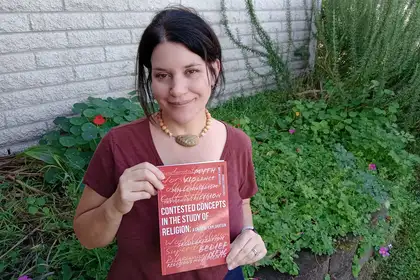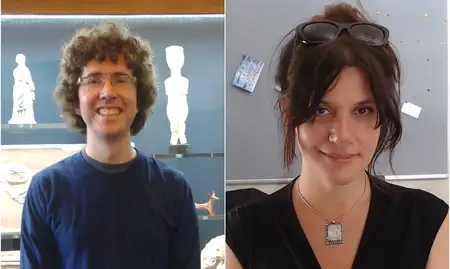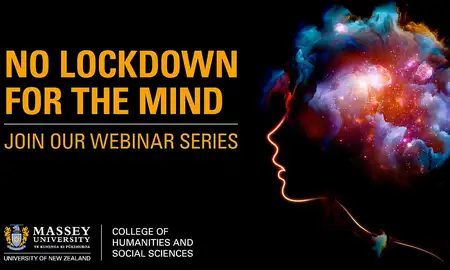
Dr Amy Whitehead.
What does the concept ‘religion’ evoke for you? What about ‘cult’, ‘guru’, or ‘myth’?
A new book, co-edited by social anthropology Senior Lecturer Dr Amy Whitehead and George Chryssides, Contested Concepts in the Study of Religion: A Critical Exploration, has been developed to help readers engage critically with problematic concepts that are commonly used, misused, or taken for granted – including ‘religion’.
Dr Whitehead says terms can be problematic for a variety of reasons.
“Some can be pejorative, such as ‘cult’ – a word typically used by opponents of certain spiritual and other groups – and ‘folk religion’, which might imply that popular spiritual practice is inferior to scholarly erudition. Other terms can be vague - what exactly do we mean when we describe a spiritual leader as ‘charismatic’ and what precisely are we claiming when we categorise a piece of narrative as ‘myth’?”
The idea for this volume began in 2019, when several scholars attended a conference organised in Torino by the Center for Studies in New Religions.
“After the proceedings had finished, George Chryssides (the book’s co-editor) and others were taken on a field trip which included a small monastic community called Church Universal Soul (Anima Universale). Its founder, known as Swami Roberto, explained that his community aims to transcend denominational barriers, but at the same time he stated that they were not ‘syncretistic’ (combining different philosophical, religious, or cultural principles and practices).”
It was this claim that started a wider discussion about how the concept of syncretism itself was problematic.
“Although different religious and spiritual concepts can interact, scholars often use the term syncretism as if it implied that there were originally ‘pure’ versions of religion that somehow became blended. Our discussion found that syncretism was not the only problematic concept used by scholars of religion. In fact, the term ‘religion’ itself is problematic, as are other concepts like folk religion, charisma, leadership, spirituality, guru and many more," Dr Whitehead says.
For example, some scholars continue to talk about a fastest-growing religion, without considering how one measures growth, or what time frame they are considering. ‘Violence’, which has become a popular subject in the wake of religious ‘extremism’ (itself a problematic concept), has been applied to a group such as Heaven’s Gate, whose members collectively committed suicide in 1997, despite the fact that the group was actually very peaceful.
Even attempts to reform our vocabulary can create their own problems. The term ‘new religious movement’ continues to lack clear content and is applied to spiritual and other groups that are neither new, religious, or movements.
Dr Whitehead explains that the book is not one that defines basic terms for the beginner, who may be unfamiliar with terms like ‘eschatology’, phenomenology and soteriology.
“By contrast, the book takes the discussion up several levels. The target reader is one who is already familiar with such concepts but recognises their problematic nature.
“For example, most readers will have come across the term ‘world religion’, but perhaps have used it without thinking, or recognised the complexity of the problems involved with the term. This anthology raises questions about the ideas that more experienced students and scholars may think they have.
“There are 24 concepts discussed in the book. The criteria for selection has been a result of both robust debate and persuasion. George and I argued and persuaded each other about the extent to which the concepts are used, and the extent to which they are problematic. As with any anthology of this kind, not everyone will agree with our selection; there is certainly more to be said on these topics, and we hope that this volume will generate further debate beyond these pages," Dr Whitehead says.
She adds that each of the volume’s contributors was given a topic related to their expertise and each author exceeded expectations with their highly critical engagement with the terms.
Contributors are from Aotearoa/New Zealand, the United Kingdom, United States, Australia, Israel and Finland. Dr Whitehead has written the section on 'Superstition' and Dr Negar Partow, also from Massey, has written the section on 'Violence'.
The book was launched online on 13 April. The launch was planned in collaboration with the Information Network on Religious Movements (INFORM), based at King’s College London. Twenty-one people attended the informal event, which was aimed at scholars at all stages in their careers and offered useful information, especially to early career scholars who are attempting to get their first book off the ground and wanted to learn more about the various stages of the publication process.
A number of contributors also spoke briefly about their role in the volume.
Dr Whitehead is the Course Co-ordinator for 146.101 Understanding Cultural Difference, 146.203 Religion, Nature and Sustainability, 146.210 Anthropology of Ritual, Religion, and Witchcraft and 146.703 The Practice of Anthropology.
Related news
Opinion: When the dead walk the earth
Dr Jonathan Tracy and Dr Amy Whitehead write about the rituals and practices surrounding Hallowe’en.

Berlin to the Bard and more for lockdown minds
From life behind the Berlin Wall to Shakespeare's England - intriguing and inspirational research from Massey's humanities and social sciences scholars is on the menu of an online public series titled No Lockdown for the Mind.
